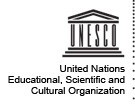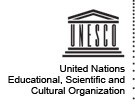United Nations Educational, Scientific and Cultural Organisation (UNESCO)

 One of 17 inter-governmental organisations of the United Nations, UNESCO was established by inter-governmental agreement in 1946. In the cultural field it aims to encourage governments to acknowledge the cultural dimension of development, to affirm and enrich cultural identities, to broaden participation in cultural life and to promote international co-operation. In 2006 it had 191 Member States. UNESCO’s programmes revolve around a wide range of themes, including world heritage, tangible heritage, intangible heritage, cultural diversity, normative action, intercultural dialogue, culture and development, cultural industries, arts and creativity, copyright, museums and cultural tourism. UNESCO’s principal functions are prospective studies, advancement, transfer and sharing of knowledge, standard-setting actions, expertise and exchange of specialised information implemented within five action areas: education, natural sciences, social and human sciences, communication and information. UNESCO plays an integral role in the UN system and works closely with a wide range of regional and national organisations.
One of 17 inter-governmental organisations of the United Nations, UNESCO was established by inter-governmental agreement in 1946. In the cultural field it aims to encourage governments to acknowledge the cultural dimension of development, to affirm and enrich cultural identities, to broaden participation in cultural life and to promote international co-operation. In 2006 it had 191 Member States. UNESCO’s programmes revolve around a wide range of themes, including world heritage, tangible heritage, intangible heritage, cultural diversity, normative action, intercultural dialogue, culture and development, cultural industries, arts and creativity, copyright, museums and cultural tourism. UNESCO’s principal functions are prospective studies, advancement, transfer and sharing of knowledge, standard-setting actions, expertise and exchange of specialised information implemented within five action areas: education, natural sciences, social and human sciences, communication and information. UNESCO plays an integral role in the UN system and works closely with a wide range of regional and national organisations.
UNESCO is the only UN agency to have a system of National Commissions in all Member and Associate States. The NACs of UNESCO are composed of eminent members of the intellectual and scientific communities in each country and form the essential link between those communities and UNESCO, helping Member States to take maximum advantage of their adhesion to the organisation. Some 330 non-governmental organisations (NGOs) maintain official relations with UNESCO and hundreds more work with the organisation on specific projects. The NACs organise their own activities, disseminate information through the publication of books and documents in local languages and participate actively in the elaboration and execution of UNESCO’s programmes. In addition, regular meetings organised between the Secretaries General of National Commissions at sub-regional, regional and intra-regional level serve to keep UNESCO and the international community informed on local as well as global needs and aspirations.
